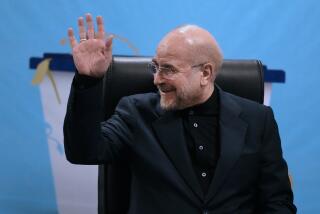As Iraqi Election Is Ratified, Focus Turns to Premier
- Share via
BAGHDAD — Iraqi authorities ratified national election results Thursday that gave a slim parliamentary majority to a Shiite-led coalition as the victors wrangled about a choice for a future prime minister among two leading candidates.
Ahmad Chalabi, the onetime Pentagon favorite who had a falling out with Washington, suggested that he had the votes within the winning coalition to snare the top job, but said a decision probably would be put off until at least Monday. He is said to be in a race with the presumed front-runner, Ibrahim Jafari, a moderate Islamist and soft-spoken physician.
“There will be no sour grapes” on the part of the loser, Chalabi promised Thursday in an interview at his heavily guarded home in this capital city’s upscale Mansour district. “Myself and Dr. Jafari are friends, and we will work together.”
Chalabi and Jafari ran in the Jan. 30 election on a list of candidates under the banner of the United Iraqi Alliance, a grouping of mostly Shiite Muslim religious parties and individuals. Results of the election were announced Sunday, but electoral rules provided several days for officials to field complaints before the results were ratified.
The alliance was allocated 140 of the 275 seats in the transitional national assembly, which will be responsible for writing a national constitution. An ethnic Kurdish slate that finished second received 75 seats; 40 went to a group led interim Prime Minister Iyad Allawi. Nine smaller slates shared the remaining 20 seats.
Allawi seems certain to be replaced as prime minister by Jafari or Chalabi.
Jafari, an interim vice president and longtime exile whose Islamic Dawa Party has deep roots in Iraq, was a natural contender for the top spot. But the rise of Chalabi, also a onetime exile who was out of Iraq for more than three decades, has injected an element of suspense into a contest mostly being played out behind closed doors.
“Chalabi is not to be underestimated,” said one Western diplomat. “But you still have to consider him the dark horse.”
Members of the Shiite alliance have been in intensive meetings trying to decide on candidates for top government jobs. Nominees for key posts -- including the prime minister, his Cabinet, the president and two vice presidents -- are expected to be presented as a package to the national assembly.
The assembly is not expected to convene until agreement has been reached on who will get the top posts. The process could take days or weeks, observers say.
On Thursday, Chalabi was savoring his renewed celebrity at his sprawling compound. Television crews came in and out, and he pontificated on a variety of topics.
“I am a very good friend of America,” Chalabi declared when asked about his tiff with his longtime patrons in Washington. “I did not change. They changed.”
Authorities in Washington, who broke with him last year, have cited a range of aggravations: His alleged passing of secret information to Iran, his alleged involvement in a counterfeiting case here and his forwarding of inaccurate information about Iraq’s supposed weapons of mass destruction before the U.S.-led invasion in March 2003.
Chalabi denied any wrongdoing. The counterfeiting case was dropped, he noted, and no formal charges emerged in the Iran case. He has also defended his prewar depiction of former President Saddam Hussein’s arsenal.
“I became, through no fault of my own, a victim of ... American political considerations,” Chalabi said. “It happens when the United States interferes in foreign countries.”
Chalabi’s aides indicated that he had the votes within the Shiite alliance to garner the prime minister’s post in a secret ballot expected next week.
Jafari, in comments after the official election results were released, said he believed the decision should be based on discussions, not a formal vote.
“I don’t think there will be a vote on this particular issue,” Jafari said. “Rather, we will keep on negotiating until we reach a conclusion.”
If a decision cannot be reached, there has been speculation in the Iraqi media that the matter could be decided by the office of Grand Ayatollah Ali Sistani, the nation’s leading Shiite figure. Sistani’s image accompanied campaign posters for the winning slate, giving it a great advantage among Shiites, who make up about 60% of Iraq’s population.
The transitional assembly’s draft of a constitution is scheduled to be put before voters by Oct. 15, though that could be delayed for six months.
If there is no delay, voters are to go to the polls again in December to elect a new government. Thus Iraq, with little recent experience in democracy, is on track to have three elections this year.
More to Read
Sign up for Essential California
The most important California stories and recommendations in your inbox every morning.
You may occasionally receive promotional content from the Los Angeles Times.










